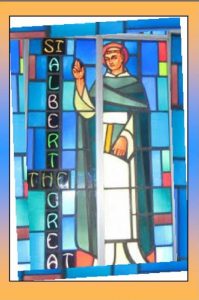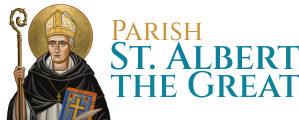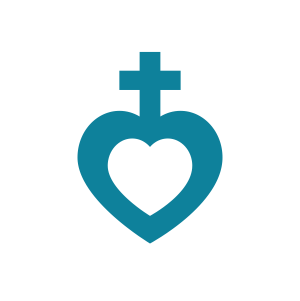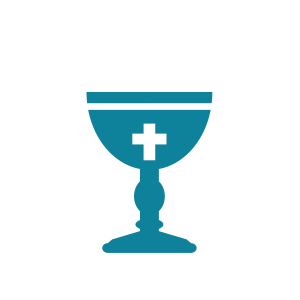Saint Albert the Great, patron of our parish, known to the world for several centuries, as Albertus Magnus, was born in 1206, the eldest son of the Count of Bollstadt, in the castle of Lauingen on the DanubeRiver. At the age of sixteen, while a student at the University of Padua in northern Italy, he presented himself to enter as a postulant the newly formed Dominican Order, the Friars Preachers. He was formally received into the Order in 1222 by Jordan of Saxony, immediate successor of St. Dominic. His family strongly opposed this decision but to no avail. By 1228 he was back in Germany teaching at Cologne. During the following several years he taught and supervised studies in the German cities of Hildesheim, Freiburg-im-Breisgau Regensburg, and Strasburg. Finally, he returned to Cologne having acquired a reputation as scholar-academician among the German Dominicans. Next he went to Paris, the center of all all learning in medieval Europe. Here he studied under the great masters until taking his master’s degree at the University of Paris. He crowned this achievement with a doctorate in 1245 at the age of 39. He returned again to Cologne where in 1248 he encountered his most renowned pupil and protégé, a young Italian friar, Thomas of Aquinas. Albert, during his lifetime, was known as the Universal Doctor because of the breadth of his knowledge and scholarship. He was master without equal of the natural sciences,physics, alchemy, geography,astronomy, mineralogy, and biology. However his lasting fame lies in the fact that he perceived early in his studies that philosophy was the queen and governing power over the other sciences. He melded the philosophy of Aristotle and the Arab savants into the science of theology, thereby, together with Alexander of Hales, laying the foundation for medieval Scholasticism which was developed by his student Thomas Aquinas and other early schoolmen at the great universities of the Middle Ages.

Unlike many scholars, Albert never lost touch for practical and administrative affairs. In 1254, he was elected prior provincial of the German province of the Dominicans. Later he defended the academic rights of the new mendicant orders against the established governance of universities. He was given the title of “Master of the ApostolicPalace” or more simply, the “Pope’s Theologian.” Since then this office has always been occupied by a Dominican friar. Albert resigned as provincial in 1257 and returned to his academic pursuits. In 1260 Pope Alexander IV literally forced him to accept consecration as Bishop of Regensburg with the charge of straightening out both the temporal and spiritual chaos which has come to this German diocese. When Alexander died within two years, Albert submitted his resignation to the new pope Urban IV, who honored it. Scarcely back at his schoolwork, he was called to preach a Crusade in Germany. When the task was completed, he was free to enjoy several years of study and peace at Cologne until the year 1274, when, at the age of 68, he was again summoned. This time to the Fourteenth General Council of the Church at Lyons in south France.
At the age of 70, he was stricken with an unusual loss of his mental powers, while defending his deceased pupil-protégé, Thomas Aquinas, before the Bishop of Paris. Thereafter, he was unable to summon the powers of intellect and polemic that had characterized him for so many decades. Albert died in Cologne on November 15, 1280 sitting among his Dominican colleagues. He was declared Blessed Albert in the 17th Century and was declared Saint and Doctor of the Universal Church by Pope Pius II in 1931 and in 1941, Pius XII declared him patron before God of those who study and probe the natural sciences, a fitting response to a world that was in those very moments of 1941 splitting the atom.






